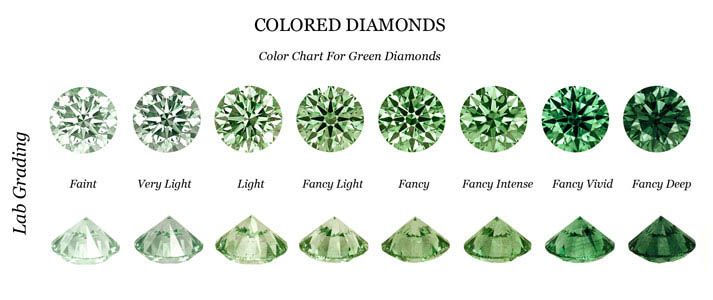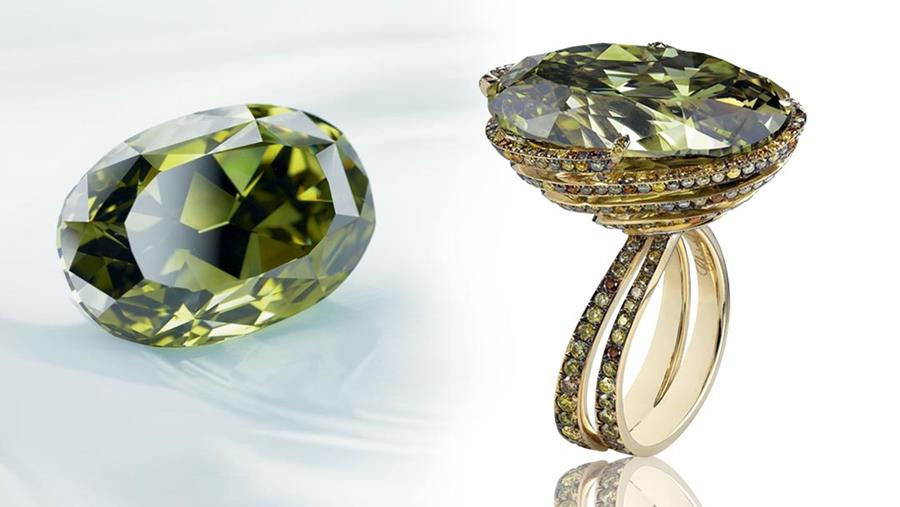Did you know? Green symbolizes growth, harmony, and freshness. Green has strong emotional correspondence with safety. Dark green is also commonly associated with money. Green has great healing power. It is the most restful color for the human eye; it can improve vision.
Green Diamonds are said to symbolize youth, vigor, activity, and life. It is also the color of nature, abundance, and prosperity.
Green color in diamonds is caused by exposure to radiation over millions of years. This natural phenomenon occurs when diamonds come in close contact with radioactive uranium from rocks near the earth's surface. In rare cases, this radiation can be found in groundwater sources.
In order to make identifying a genuine green diamond easier, some polishers have taken to leaving what’s called a “Natural” on the girdle of the stone. A “Natural” is an unpolished area between the girdle and pavilion, exposing the natural color of the rough. This mark allows gemologists assessing the stone to recognize the color as natural and provide the diamond with appropriate certification.
Pure green diamonds are preferred, but most of the stones contain secondary colors. Green diamonds have been known to have gray, brown, yellow, and blue as secondary hues.
Green diamonds are considered one of the rarer colors within the Fancy Diamond world. In fact, the only colors that are more difficult to find are red, pink, blue, violet, and orange. Because of green’s extreme rarity, these diamonds are often far pricier than other colored diamonds.

The strength of a diamond’s color is referred to as the color intensity level. Each Fancy diamond has different intensity levels by which it’s evaluated. Green diamonds range from light green to a rich, deep hue. The grading scale includes Faint Green, Very Light Green, Light Green, Fancy Light Green, Fancy Green, Fancy Intense Green, Fancy Vivid Green, and Fancy Deep Green.
Famous Greens

Dresden Green The most famous natural-color green diamond is considered by many to be the Dresden Green – the largest-known natural green diamond weighing approximately 40.70 carats. The Dresden Green has a storied history. It probably originated in the diamond mines of the Golconda district in India and was brought to London around 1726. It was purchased that same year by Friedrich Augustus I, Elector of Saxony and King of Poland, and was subsequently sold to Friedrich Augustus II in 1741. A year later, it was set in a specially commissioned badge of the Order of the Golden Fleece (the Order was founded in 1429 to “encourage and reward virtue and faith among men of high lineage”). In addition to its long history, which predates experiments with artificial irradiation, the Dresden Green is famous because its green color was created by natural radiation and the color is throughout the stone – not just at the surface as is typical of natural green diamonds. Theories have been suggested about natural sources of radiation and geological conditions that would produce this green body color, but such diamonds are quite rare and the source is still undetermined.

The Ocean Dream Diamond The Ocean Dream is a diamond measuring 5.51 carats, rated in color as Fancy Deep Blue-Green by the Gemological Institute of America. The Ocean Dream is the first and one of the only natural diamonds known to the GIA to possess a blue-green hue, making it one of the rarest diamonds in the world. Unfortunately, there is not too much information about the history of the Ocean Dream diamond available. It is known that it was found in Central Africa, but no information as to which mine or what year it was found exists. Also, the diamond's current owner, the New York-based Cora Diamond Corporation, came to acquire the Ocean Dream, but when and how it was purchased was never publicized.

The Gruosi Green The Gruosi Green diamond is of South African origin, but other details of the early history of the diamond such as the mine of origin, date of discovery, etc. are not known. Initially weighing approximately 100 carats, the rough was purchased by Fawaz Gruosi during 1998. From there, Gruosi had ¾ of the stone’s weight shed, transforming it into a truly breathtaking 25 carat, cushion cut, Green diamond. While the clarity of the diamond has not been disclosed, in a statement Gruosi said it has a “near-flawless” grading.

The Chopard Chameleon While not strictly a green diamond, the Chopard Chameleon is the world’s largest known example of a chameleon diamond. The 31.31-carat oval cut diamond with virtually no inclusions was acquired by Chopard in 2007, comfortably exceeding the previous record for a chameleon diamond at 22.28 carats. The stone was unveiled to the public at Baselworld 2008 and is set in a ring with a pavé setting of other small fancy colored diamonds.

The Aurora Green The Aurora Green Diamond is a 5.03-carat vivid green diamond with VS2 clarity. In May 2016, the Aurora Green became the largest vivid green diamond to ever sell at auction. The diamond was sold by Christie's for a record price per carat of $3.3 million to Chinese jewelry company Chow Tai Fook, totaling $16.8 million. It's special not only because of its size, which makes it the largest Fancy Vivid Green Diamond ever sold at auction, but also because of its VS2 clarity, and that it has no fluorescence, which is extremely rare for such a diamond.
FCD Invest Exclusive

Similar in nature and appearance to the famous Aurora Green (above), this Green Diamond is a stunning example of the power of green (and pink!) diamonds in nature. Fancy Intense Green diamonds are some of the rarest diamonds on earth with strong long-term investment values. This breathtaking 4.31-carat natural Fancy Intense Green, cushion cut diamond is GIA Certified and available for purchase. This beautiful diamond has no fluorescence and its similarity to the Aurora Green makes it incredibly coveted.
If you are interested in purchasing or selling fancy color diamonds as an investment, please email Rayah Levy at rayah@fcdinvest.diamonds to discuss your personalized long-term luxury investment asset strategy.

Comentários